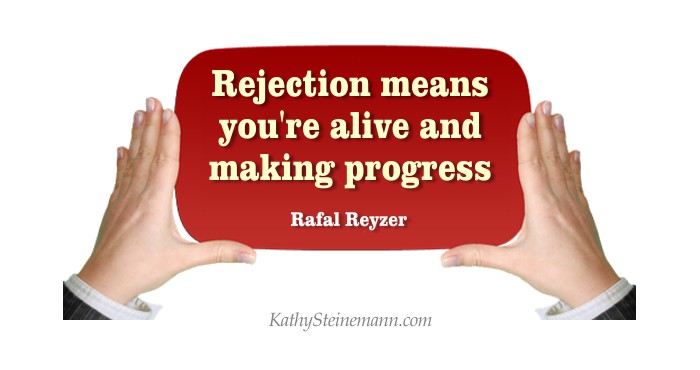
Writers, do you let rejection discourage you, or do you dust yourself off and leverage it to improve your writing? Rafal Reyzer provides a few tips in this guest post.
—
Handling Rejection as a Writer
I recently did my best to write an article for a popular website in my niche. I filled it with cultural anecdotes and infused it with certainty and insight. I wanted to create something that would make an impact and help people find optimism in these strange times. This is the response I got:
“Rafal, thanks for the offer. However, this isn’t an article for (the name of the website). It’s impersonal and mechanical. If you’ve read articles on (the website), you know I don’t publish that kind of emotionless bland stuff.”
This is not the first time my work got rejected, but for some reason, the “emotionless bland stuff” bit felt like a measured kick in the groin. Self-doubt started to creep in. Maybe I’m not a good writer after all, I thought. This self-deprecating rumination went on for a couple of hours until I remembered these words:
“In every adversity there lies the seed of an equivalent advantage. In every defeat is a lesson showing you how to win the victory next time” ~ Robert Collier
This poignant piece of advice allowed me to shift focus and embrace a more positive outlook on getting rejected as a writer.
Rejection means you’re alive and making progress toward your dreams
Guess how many times Kathryn Stockett’s The Help was rejected. Sixty times. Stockett wrote: “After my five years of writing and three and a half years of rejection, an agent named Susan Ramer took pity on me. What if I had given up at 15? Or 40? Or even 60?”
The book became a New York Times bestseller and stayed on the list for over 100 weeks, selling over seven million copies and getting adapted into an Oscar-winning film.
This is perhaps an extreme example, but it’s an instructive one to keep in mind next time your work gets rejected. In a writer’s mind, the word “rejection” should translate into “keep on trying” or “almost there.”
This outlook on rejection applies to romantic life as well. It’s like when you go on a date and get rejected. You’re damn right it’s personal, but it’s also a sign that you’re alive, and you live a life throbbing with excitement, instead of seeking hideout from emotional pain.
Treat rejection as a source of valuable feedback
Sometimes you’ll have to admit that you further need to burnish your prose before it’s ready to meet the eyeballs of your readers.
So instead of responding to rejection with resentment, look for a valuable lesson that’ll make your writing better. Be inquisitive, and openly ask how you can improve what you’re doing. This then shifts the rejecter-rejectee relationship from an adversarial one to something more akin to cooperation, which is much healthier.
What one great thing would you dare to dream if you knew you could not fail?
This is an important question to ask yourself if you want to reach your goals. Many writers fear rejection so much that they don’t even get started on their dream project. It’s not only the fear of what publishers, agents, or editors might think. It’s also the fear of scorn from the side of the public. But this is an irrational fear, because most of the time, the worst-case scenario is that your work won’t make the splash you were hoping for.
Thinking about writing won’t change a thing. You are a creator, a designer of worlds, a crafter of stories, so assume an aura of confidence and never let anyone tell you that you can’t do it.
© Rafal Reyzer
—

Rafal Reyzer is a full-time blogger, freelance writer, editor, and content manager. He started RafalReyzer.com to provide readers with quality writing and blogging tools they can use to achieve freedom from 9-5 through online creativity. His site is a one-stop-shop for writers, bloggers, publishers, content enthusiasts, and freelancers who want to be independent, earn more money, and create beautiful things.
The Writer’s Lexicon series.
Available in both digital and print editions.
Discover more from KathySteinemann.com: Free Resources for Writers
Subscribe to get the latest posts sent to your email.

What an inspiring post Rafal. I’ll keep these important lessons in mind for future rejections. 🙂
Thanks for stopping by, Debby.
I’m happy you’ve found this post interesting! Take care 🙂
I am a young writer and I feel like people some times like my work too much, I let it get to my head one time and I showed it to someone who didn’t like it. I didn’t know what to do because everyone else liked it, and I didn’t want it to change for one person but I wanted that one person to like it. . . I honestly didn’t know what to do
Thanks for reading Rafal’s post, Carter.
Opinions of others can help you or hurt you. Remember that you are the writer. You are in control. Even the greatest writers receive negative feedback.
Hi Carter, Thanks for your comment. I think it’s great to develop a “no-expectations” mindset when showing your work to others. I highly recommend you read a few books on stoicism to help you with that. But the most important lesson seems to be that you’re always in control when it comes to how you react to any situation. This is not easy, but you can get better with practice. Take care!